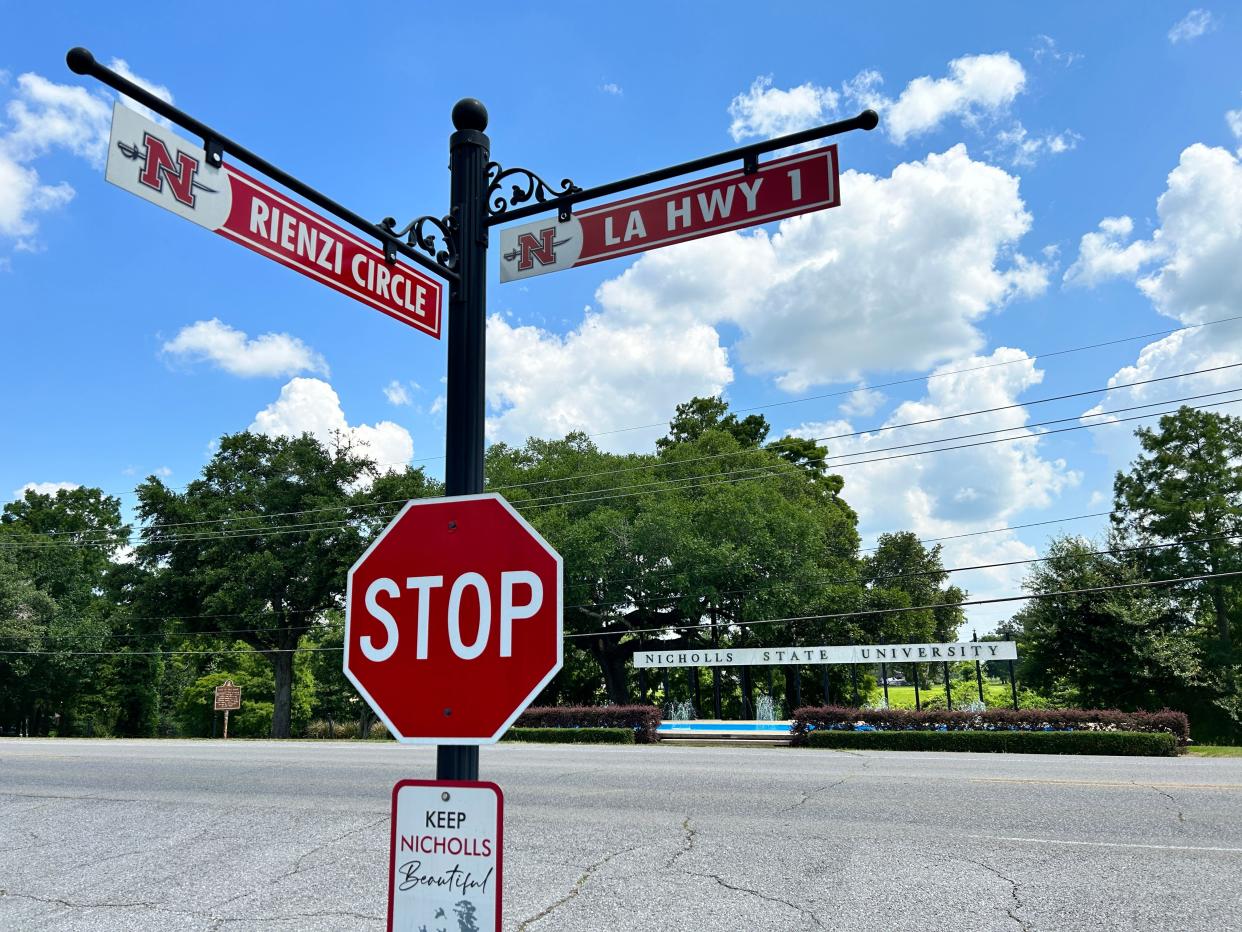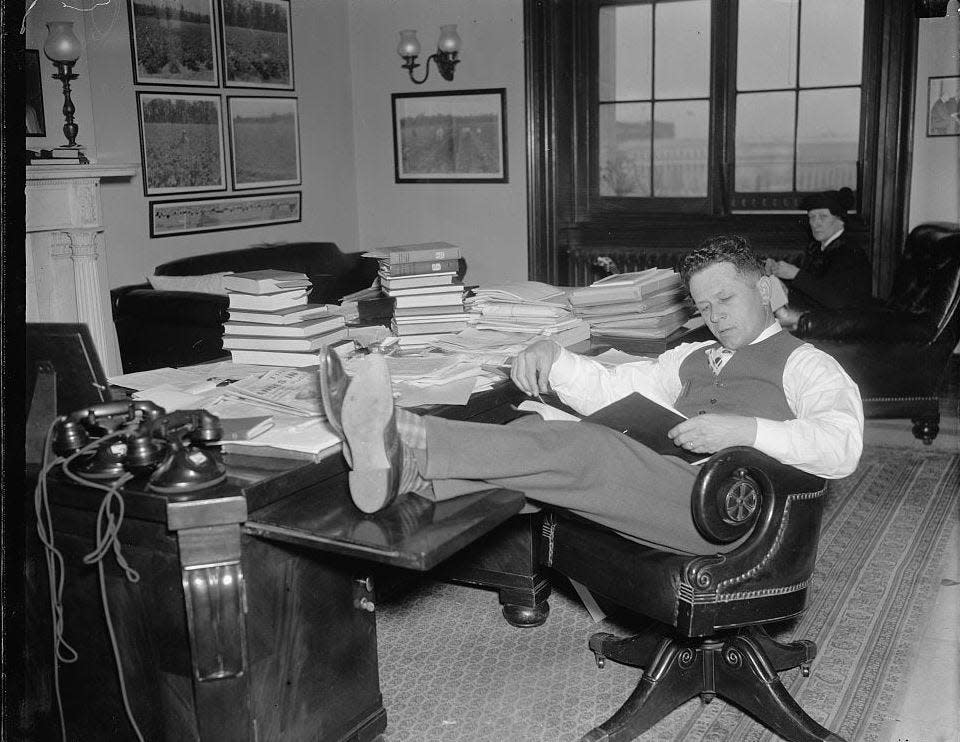Reckoning with racism: School name changes often start with activism, community dialogue

- Oops!Something went wrong.Please try again later.
In many cases where names of schools or buildings are identified as having problematic namesakes, community leaders throughout the U.S. — North, South, East and West — have stepped up to encourage discussion and, in many instances, change.
Locally, that hasn’t been the case except, to some degree, for Nicholls State University and E.D. White Catholic High School, both in Thibodaux.
The university did organize listening sessions and has made some changes to street and building names consistent with historical sensitivity. The Catholic Diocese of Houma-Thibodaux, under former Bishop Shelton Fabre, did an extensive review of E.D. White’s history and retained the school’s name.
At Terrebonne Parish’s public schools, however, the discussion hasn’t happened.
“It does depend on a group in the community saying this is something we should address and raising it in the venues where it is appropriate to do that,” said Barry Erwin, director of the non-partisan Council for a Better Louisiana.
“If it’s raised as an issue, it is not unusual to see task forces or groups put together to have a dialogue and tell them ‘come back to us,’” Erwin said. “That has resulted in listening sessions, to hear one side and hear the other, even if people disagree. It is important to hear why people want to keep (the name) and why do they think it needs to be changed.”
Changes underway across the country
A USA TODAY analysis, updated in December, found more than 80 schools across the country, including two in Louisiana, dropped racist namesakes in the aftermath of George Floyd’s 2020 murder. Universities across the country have reckoned with the same issue, some opting for name changes and others not.
In many cases, the changes were prefaced by a review, creation or updating of policies that determine how buildings are named or renamed.
In November, Inside Higher Ed reported that it found similarities in the policies it had reviewed since 2020, including a common stipulation that building names should be changed rarely and only when necessary. Some policies recommend officials consider opportunities to keep building names and add context to them, including whether the person’s legacy represents the university’s modern values.
'Often divisive process'
“The policies seek to lend objectivity and fairness to the often divisive process of changing a building’s name. In nearly every case of denaming, some members of the campus community argue that keeping the name of a historical slaveholder or white supremacist on a building is equivalent to their institution endorsing those actions and beliefs. Students of color may feel especially unwelcome, or even unsafe, stepping into a facility emblazoned with the name of, say, a politician who advocated for segregation,” Inside Higher Ed wrote.
“Meanwhile, others believe that removing those names is analogous to erasing the important roles those individuals may have had in the history of the region or university. Individuals with longstanding connections — including alumni, trustees, donors and longtime employees — may object to changing the identity of an institution they know and love,” the article continues.
Looking back: In 2004, then-Nicholls president bans gray-suited mascot Tillou
Of the policies reviewed by the education journal, the University of Richmond, a small private school in Virginia, had the only one that specifically outlines criteria that would disqualify someone from having a building named after them.
Among provisions, the policy says “no building, program, professorship, or other entity at the University should be named for a person who directly engaged in the trafficking and/or enslavement of others or openly advocated for the enslavement of people.” Individuals may also be disqualified if they had a significant role in “the promotion of segregation, eugenics or other forms of discrimination based on protected class.”
The policy has led to the removal of at least half a dozen names from campus buildings.
What local policies say
A University of Louisiana System policy establishes basic procedures for any renaming on its campuses, including Nicholls. But the policy, the result of a 1995 state law, does not specify what criteria will be used to determine whether a person is worthy of the honor.
System President Jim Henderson said university names are set in state law. Any proposed change would require approval from the Louisiana Board of Regents for Higher Education and the state Legislature.
The Terrebonne Parish School District’s policy, last updated in 2013, also includes no naming criteria, other than prohibiting the School Board from naming any building after a living person.
Interviews over the past several months have indicated that resistance to discussing name changes for local buildings is often spoken in the same breath as the emotional topic of removing statues from public spaces, a particularly sore subject in Louisiana due to the purges of Confederate statues in New Orleans.
Controversy over monuments and statues has provided some examples of a middle ground which – given proper dialogue – could be applied to community discussions of building names.
In Ascension Parish, where the Mississippi River once met Bayou Lafourche, the Confederate dead were memorialized in connection with an 1863 battle that occurred there.
'This worked for us'
There was Black community opposition to the monument, erected in 1999, and Kathe Hambrick-Jackson, founder of the River Road African-American Museum in Donaldsonville was approached with questions about how it could be removed.
Hambrick-Jackson had other ideas, however.
She established a campaign for a memorial to Black federal soldiers who lost their lives in the successful battle to defend Fort Butler, and it now stands near the Confederate monument.
“My approach was that in this age of Black Lives Matter we waste energy trying to tear something down instead of building something up that can educate our children in a more positive light about our history,” Hambrick-Jackson said, adding that the same approach can be made when it comes to building names. “This is what worked for us. I can’t say if it will work for other communities or situations.”
'Talk about who they really were'

Margie Scobey, co-founder of the Finding Our Roots African-American Museum in Houma, takes an approach similar to Hambrick-Jackson’s.
“My true thought is put all the history with it,” she said. “Tell students who (the late U.S. Sen. Allen) Ellender was. If you want to highlight somebody with hate in their heart and honor them, talk about who they really were.”
Confederate monuments: What the men honored by statues did and believed
Jim Bowie Park in Houma, Scobey noted, is named for a notorious slave-trader.
“That history could be shared in a park exhibit or plaque," she said. "Different types of changes can be made to correct the wrongs.”
Some local officials, while not convinced changes of school names are necessarily in order, have said they are willing to look at the questions surrounding the issue and that it should be approached with an open mind.
'A community thing'
Terrebonne School Board member Matthew Ford, a Nicholls alumnus, said he has concerns over “what is this university or this institution doing and providing currently for our community versus whom they were named after, and whether I am aligned with the set of values they have. … I am the last person to say I am eager to be on the side of someone who was a Confederate soldier or involved with slavery.”
Ford said it is understood that teaching about injustice visited on various peoples occurs because there is a desire for such things not to happen again, not because there is an appreciation of their oppressors.
He and some others in local educational systems maintain that perhaps the time has come for such matters to be talked about.
“As far as entertaining the idea of having discussions,” Ford said, “I think we should always be open to having discussions. It’s going to have to be a community thing, with everyone involved, not just the squeaky wheels.”
John Kelly DeSantis is a freelance journalist and a former reporter for the Houma Courier and Thibodaux Daily Comet.
This article originally appeared on The Courier: Is there a roadmap for navigating arduous debate over school names?

